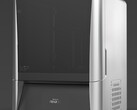In a development that could significantly enhance the durability of 3D-printed materials across the board, Dr. Sanna Siddiqui, a Florida Polytechnic University professor, received a US$150,000 grant to study how 3D-printed rocket engine components perform in comparison to conventional parts. These components are made of nickel-based super alloy and are significantly more durable than any 3D-printed materials found currently in the consumer space.
Over the course of the two-year grant, Dr. Siddiqui's team is expected to test out 3D-printed rocket engine components subjected to a wide range of operational loads, simulating what they'd be going through during a NASA rocket launch, for instance.
The wider implications here are interesting. As of now, 3D printing has largely been restricted, at least in the consumer space, to being a platform for cheap prototyping and DIY projects - durability has never been a key factor. However, the push for leveraging 3D printing in extreme use cases like rocket engines could push manufacturers to deploy those technologies in the consumer space in the years to come. This could potentially translate into substantially cheaper cars and other products, with greater customizability.
















